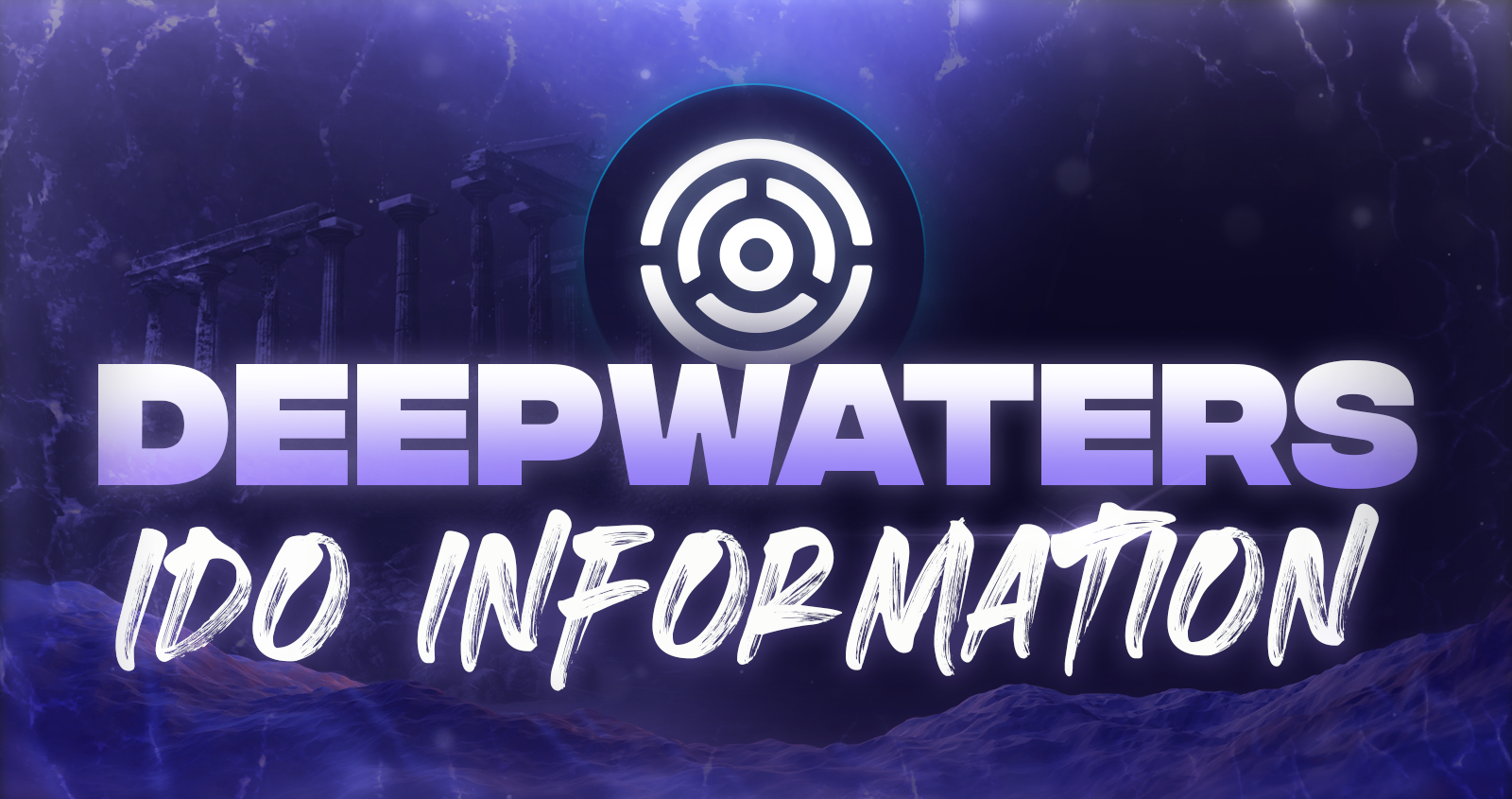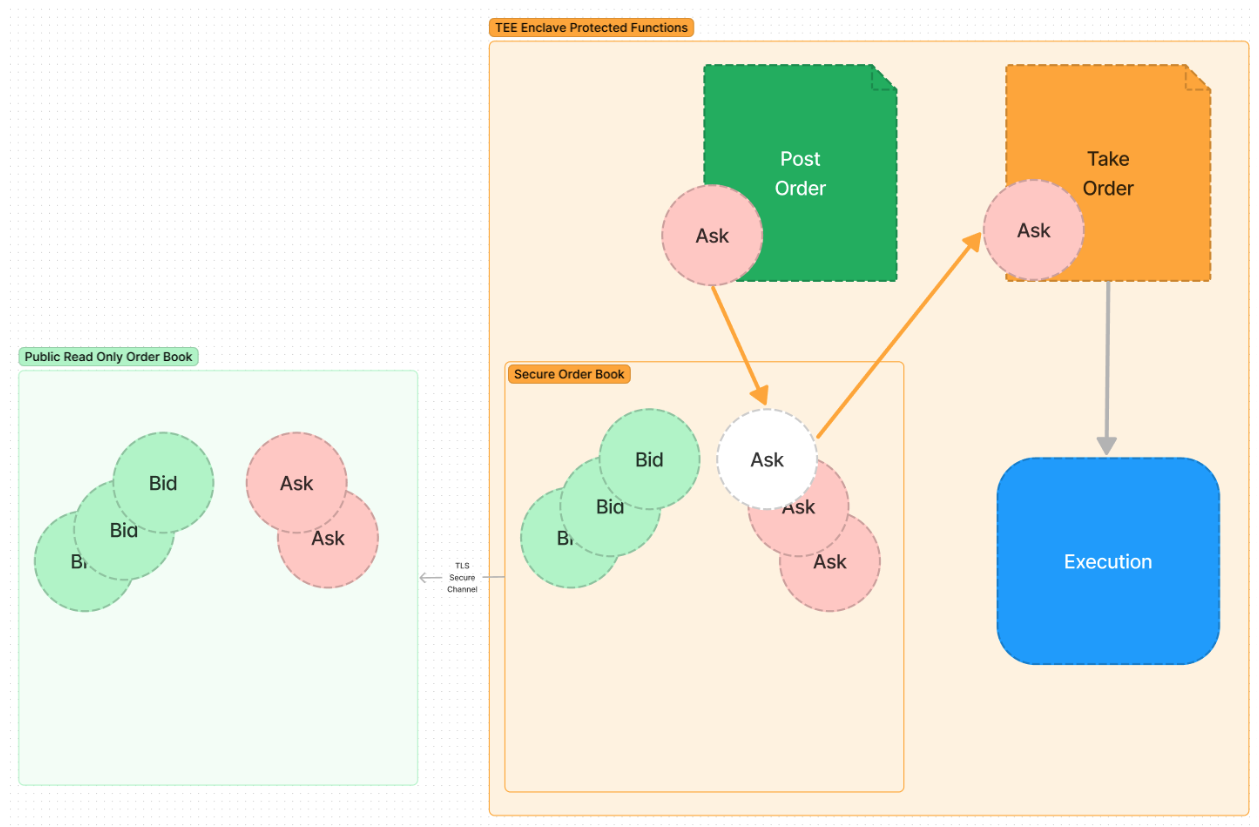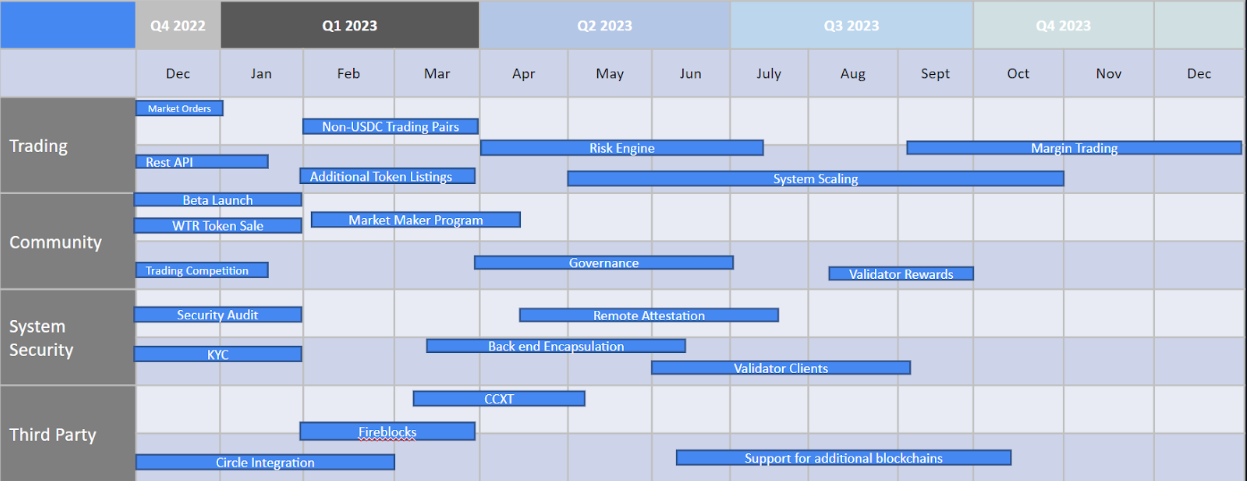DEEPWATERS X AVALAUNCH: IDO ANNOUNCEMENT
INTRODUCTION
The broken trust and absence of promise that has marred the crypto landscape over the last year has largely been the work of CeFi i.e. centralized financial institutions, private equity firms and insider-controlled projects. Unfortunately, these headline grabbing stories have come replete with scandal and corruption worthy of the soapiest of dramas; effectively conflating CeFi and DeFi to the non-native crypto population. Violations of custody have cost traders tens of billions of dollars and 2022 saw traders face immense losses from Voyager, Celsius, FTX, and others. While unscrupulous and predatory behavior is nothing new to the regulated world, the collateral damage to DeFi has been significant. Despite the seeming steps backwards, these recent mishaps fortify the case for an emergent decentralized financial system. Among the chief tenets of decentralized finance are the principles of fairness and inclusion which includes access to tradfi level trading experiences to go with inclusion and self-custody.
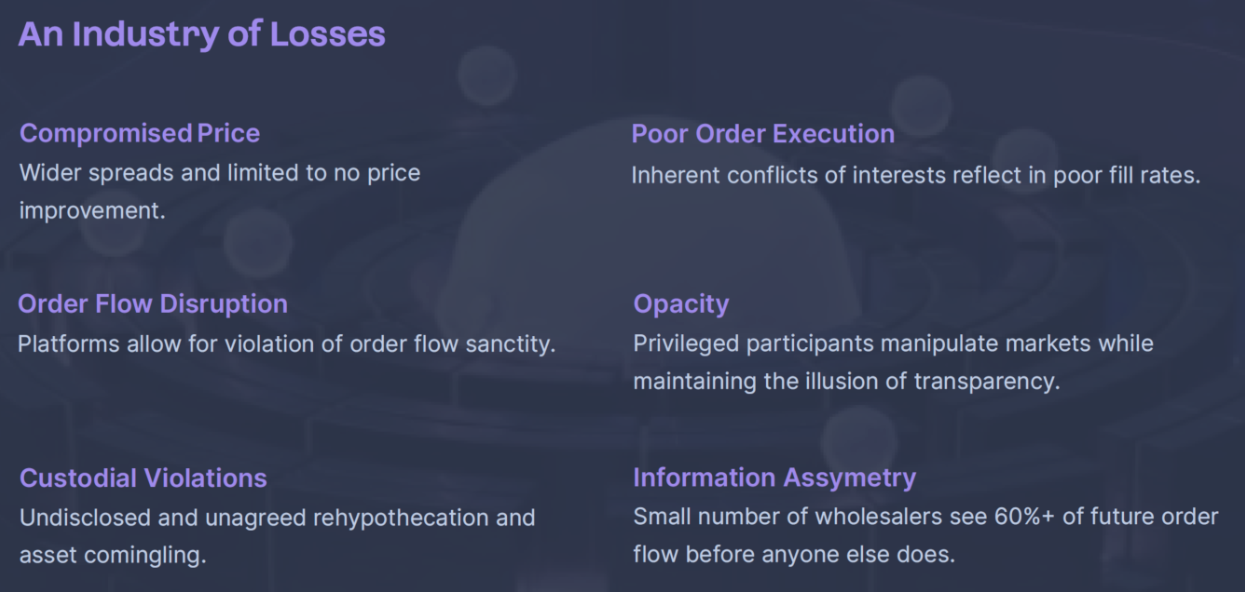
DEEPWATERS
Deepwaters is a different type of exchange that represents a quantum improvement over previous exchange technologies. As we consider the crypto exchange carnage of 2022, we must recognize that there are problems that have hounded crypto traders from inception.
Centralized exchanges control access to information and order flow. As we have seen many times, this creates misaligned incentives for privileged parties to abuse this control through internalization and Payment for Order Flow (PFOF). In essence, traders are playing against the house. Additionally, exchanges have violated the custody of traders’ assets, repeatedly losing those assets to hacks or financial mismanagement. DeFi was born largely due to the lack of trust in financial intermediaries.
Meanwhile, mass market adoption of DeFi has been obstructed by the inability of DeFi to meet the expectations established by the tools of traditional finance. Slippage and front-running create inefficiencies for large traders, and high gas/platform fees make them less accessible for smaller traders. Platforms lack composability, requiring bridges that are susceptible to hacking. Decentralized exchanges cannot compete with centralized and traditional trading without addressing predation, friction, risk, and fragmentation all together.
The failures of these systems manifest for different reasons, but affect traders similarly: risk is increased, and profitability decreases.
Deepwaters is bringing the trustlessness of DeFi to centralized finance, building the first provably fair centralized exchange. On Deepwaters, all traders have provably equal opportunity, and all orders are invisible to everyone, including Deepwaters itself, until they are executed or hit the public order book. This means:
- No front running, MEV, or sandwich attacks
- No PFOF or order internalization
- Any reordering or order flow privileges are impossible
- No adverse selection
-No information asymmetry or data bleed
Violations of custody have cost traders tens of billions of dollars. Deepwaters’ architecture ensures it can only run audited, open-source code with operations that are validated in real time by a decentralized network. In addition to guaranteeing the sanctity of order flow, this disallows discretionary actions with users’ assets, so there can be no rehypothecation or custodial violations. Deepwaters will also be able to be used in a completely non-custodial manner for further asset security, and any deposits / withdrawals occur at the speed of the relevant blockchain.
Deepwaters combines the best of centralized and decentralized platforms while adding novel functionality to provide a service which is highly efficient, compliant with regulations, yet trustless.
THE DEEPWATERS DIFFERENCE
Deepwaters solves the following problems that are present in conventional centralized and decentralized order books and automatic market makers (AMMs):
| Problem | Central Limit Order Book (CLOB) | Invariant AMM | Deepwaters |
| Compromised Price | PFOF[1] widens spreads. Adverse selection. Price Fade. | Local scarcity micro economic price discovery anchored in arbitrage (invariant-based slippage + MEV-based slippage) | PFOF is provably impossible |
| Order Flow Disruption | Privileged parties can change and block order flow. | MEV[2] players change and block order flow | Order flow Immutability |
| Poor Order Execution | Front-running and sandwiching by privileged parties.
Bifurcation of orders. |
MEV players sandwich and front-run traders | Front-running and sandwiching is provably impossible |
| Opacity | Bid/Ask pyramid may not reflect reality (order flashing)
Informational Asymmetry. |
Just-in-time liquidity and other MEV-based attack vectors | WYSIWYG[3] |
| Custodial Violations | Undisclosed and unagreed asset rehypothecation and commingling | Immutable custody, but smart contract risk. | Immutable custody, but smart contract risk. |
Deepwaters uses on-chain technology to support self-custody: deposits and withdrawals are done using smart contracts. Business logic and critical data are encapsulated in a TEE enclave. Independent validators are compensated to verify integrity of the system as a whole. Market participants interact with Deepwaters through technology that they’re used to: the Deepwaters Trading API and trading terminal. All business logic is open-source. Validators can subscribe to log replication and native TEE cryptographic attestation to verify that behavior is as intended. These validators are compensated to verify behavior and dispute against bad actors.

Nodes running the Deepwaters application and TEE are distributed across varied regions and participate in RAFT[4]-based consensus. In this way, the system exhibits crash fault tolerance and replication of data while maintaining high throughput, allowing for complex operations, and hindering attempts for any participant to gain advantage in speed over another by means of server colocation.
The resulting order book is public, however the integration of a TEE ensures that incoming order flow is confidential until after it is posted or matched against the existing order book. Sequencing and execution of orders is the same for all parties, including the host of the engine.
The majority of actions initiated by users will occur off-chain, utilizing the Deepwaters Trading API. A combined cross-chain state of user balances and other information is held in a secure computing environment. Actions can only be created by a user, who cryptographically proves they own the address associated with the action they are initiating. On-chain settlement is only required during withdrawals, improving system efficiency.
Deepwaters Beta version development pipeline.
Over 60% of exchange order flow is internalized (usually via internal netting on the exchanges themselves or payment for order flow to market makers; “PFOF”). This means orders are sold or internalized by the exchange before they hit the orderbook, and not matched to other traders. Orderbook spreads are 25% larger as a result of internalization, costing traders over $200m daily. Some or all of the price improvement is taken by the internalizing counterparties.
Internalized orders are filled slower and in a manner that maximizes adverse selection (90% more likely to happen), resulting in orders losing value immediately upon being filled.
Deepwaters is bringing trustlessness to centralized finance, building the first provably fair, centralized, optionally self-custodied exchange. On Deepwaters, all traders have provably equal opportunity, and all orders are invisible to everyone, including Deepwaters itself, until they are executed or hit the public order book. This means:* No front running, MEV, or sandwich attack
- No PFOF or order internalization
- Any reordering or order flow privileges are impossible
- No adverse selection
- No information asymmetry or data bleed
Consider the difficulties one encounters with centralized exchanges:
- Inexplicable system outages
- Hacks
- Funds concentrated in custodial wallets
- Difficulties withdrawing or depositing funds
- Frontrunning
- Improper use of customer funds: Staking, leverage etc.
- Erroneous account seizures
Conversely, AMM driven DEX’s come with their own peril:
- Impermanent loss
- Absence of order books
- Variable and costly gas fees
- Failed transactions
- Predatory bots
Deepwaters exists to solve all of these problems.
[1] PFOF: payment for order flow
[2] MEV: miner extracted value
[3] WYSIWYG: what you see is what you get
[4] The Raft Consensus Algorithm
https://raft.github.io/
TRACTION
- Deepwaters has had over 140,000 registered wallet addresses access its testnet. These users have placed over 7 million orders and 2.5 million trades.
- Four community members have created custom libraries to connect to Deepwaters.
- 85,000+ members in Discord, 47,000+ followers on Twitter.
- According to DappRadar & ICOdrops, in November 2022 Deepwaters was the fastest growing unreleased project in all of web3.
DEEPWATERS—LINKS & TEAM
Website | Telegram (Discussion) | Twitter | Blog | Blog II | Discord | Github
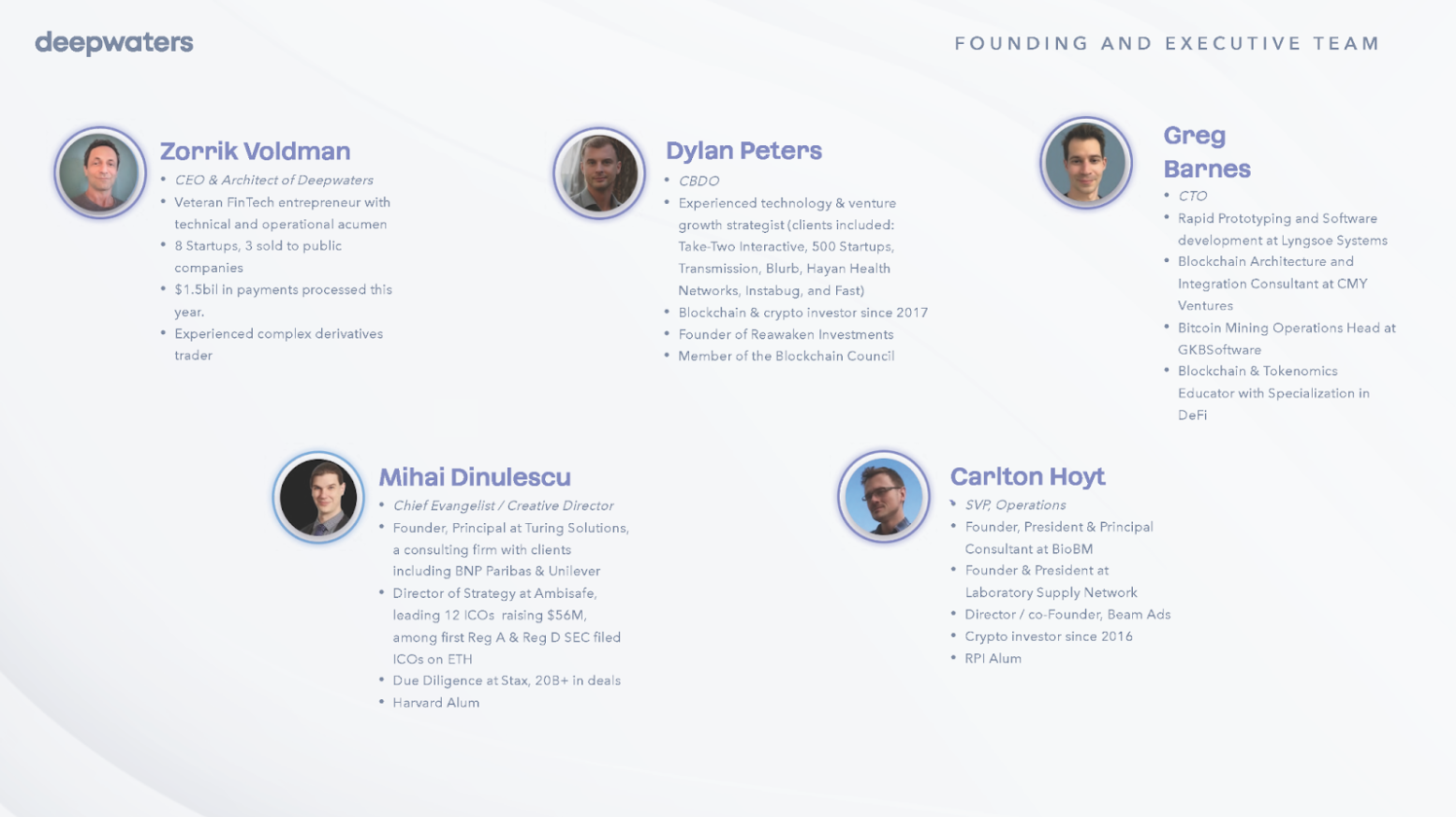
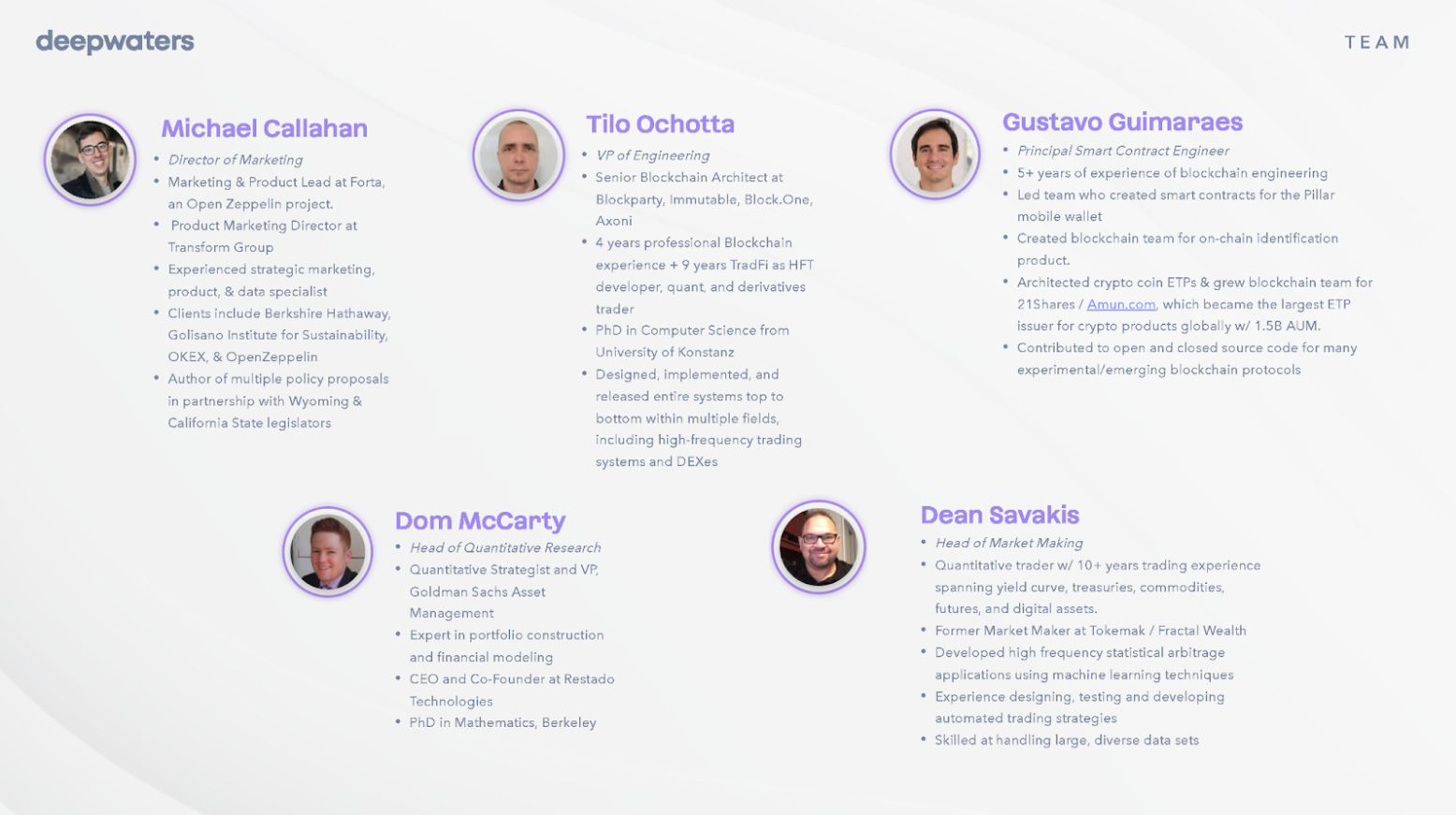
PARTNERS & BACKERS

“IVC is proud to back Deepwaters, which aims to transform the way centralized finance operates by incorporating principles of DeFi into CeFi, providing traders with the first centralized exchange that is provably fair and secure.
With its hybrid architecture and real-time & decentralized platform validation, Deepwaters guarantees equal opportunities for all traders and upholds the necessary efficiency and compliance for the greater adoption of DeFi technology.”
– Jeremy Hsiao, Infinity Ventures Crypto (IVC)
“With Avalanche being the primary state layer for Deepwaters, Blizzard is extremely excited to support one of the most experienced and savvy teams in crypto.”
– Yi Hsin Wei, Blizzard Fund (VC arm of Avalanche)
“Deepwaters team has a very professional team background to complete what they are trying to solve. The problems deepwaters trying to resolve are significant. They combine the best of centralized and decentralized platforms while adding novel functionality to provide a service which is highly efficient, compliant with regulations, yet trustless. We are very bullish on what they are doing.”
– Sona, LD Capital
“We are one of the earliest investors that supported the Deepwaters team. We enjoyed working with the team for their deep expertise in building robust trading infrastructure, innovative ideas, willingness to take feedback, and ability to execute”
– Calvin Du, OP Crypto
CONCLUSION
The automated market maker represented a breakthrough in trading technologies. Quite swiftly, decentralized exchanges (“DEX”) were generating trading volume on par with their incumbent centralized counterparts but not without drawbacks. There has been nothing in the decentralized world where speed did not play a factor, where technology could not be used to game the system and certainly, nothing resembling a virtuous hybrid that offers an institutional grade self-custodied exchange.
Lowered barriers to entry, inclusiveness, disintermediation are some of the “true Norths” that blockchain has been founded upon and somehow, provably fair exchanges have not taken center stage. The maxim “move fast and break things,” has served crypto quite well but has also left some gaping holes in its wake.
Deepwaters is combining the ethos and trustlessness of DeFi with the efficiency, compliance, and throughput needed to ultimately bring this technology to TradFi.
The team at Deepwaters has deep experience across tech, fintech, and crypto/blockchain. Collectively, the team has had multiple large, public exits, conducted over 10 ICOs (including Reg A and Reg D exempt tokenized securities), built high-frequency trading systems, architected cryptocurrency-based exchange-traded products, and founded and scaled many companies prior to founding Deepwaters. There are 16 full-time, non-anonymous team members, including 3 PhDs.
The beta version of Deepwaters is going live on January 31.
“If I could summarize the Avalaunch team in a few words, it would be ‘integrity and competence’. We greatly appreciate that the Avalaunch team only puts forward projects that they themselves believe in. Avalaunch team was thorough in trying to understand our token, technology and intent. Their deep understanding of Deepwaters tokenomics resulted in a wealth of helpful advice, particularly about protecting retail post launch, a major concern of ours. Deepwaters mission is that of creating a level playing field. We want the general public to have the same opportunity as everyone else. This was the common ground for us. The Avalaunch team cares about their community. For them, running a launchpad is about passion for the crypto sector and love of the Avalanche community. That resonates well with us. Of course, they’re also just all-around great people. It was a real pleasure working with Avalaunch, every step of the way.”
– Zorrik Voldman, CEO / co-Founder
TOKEN ECONOMICS
The WTR token (pronounced “water token”) is a utility and governance token for the Deepwaters ecosystem. WTR is accepted for goods and services provided by Deepwaters. It also provides coordination mechanisms for future development and various system parameters. While WTR is not explicitly required to use Deepwaters, it will provide the user with exclusive benefits, improving and expanding the user’s overall experience while allowing them to take part in the evolution of the ecosystem through governance.
The total maximum supply of WTR is capped at 350,000,000 units (350 Million units). Issuance is both milestone-based and time-based. This is an effort to ensure that token distribution is commensurate with success of the platform and distributed over time.
WTR can be spent on various goods and services provided by Deepwaters. Some examples include:
- Trading fees
- Purchasing Deepwaters Memberships / Subscriptions
- Deepwaters premium data
Fees are denominated in relevant assets, corresponding to the user’s actions. WTR can be used to pay a portion of the fees on Deepwaters at a fixed dollar-denominated exchange rate of $0.70. The allowable portion is a protocol-defined parameter, subject to the user’s current subscription and/or recent trading volume.
A RELEVANT EXAMPLE:
User Alice executes a trade, selling 10 ETH for a price of 2000 USDC/ETH
Alice pays a fee of 10 bps: 20000 USDC x 0.001 = 20 USDC:
50% of the fee is paid in USDC (10 USDC)
50% of the fee is paid in WTR at 1 WTR/$0.70 USD (~14.29 WTR)
ALLOCATION AND DISTRIBUTION
Distribution of tokens is designed to promote a fair and diverse set of token holders, as shown below. By enabling all stakeholders to participate in governance and token utility, the system is set up with checks and balances ensuring the best interests of the project are pursued.
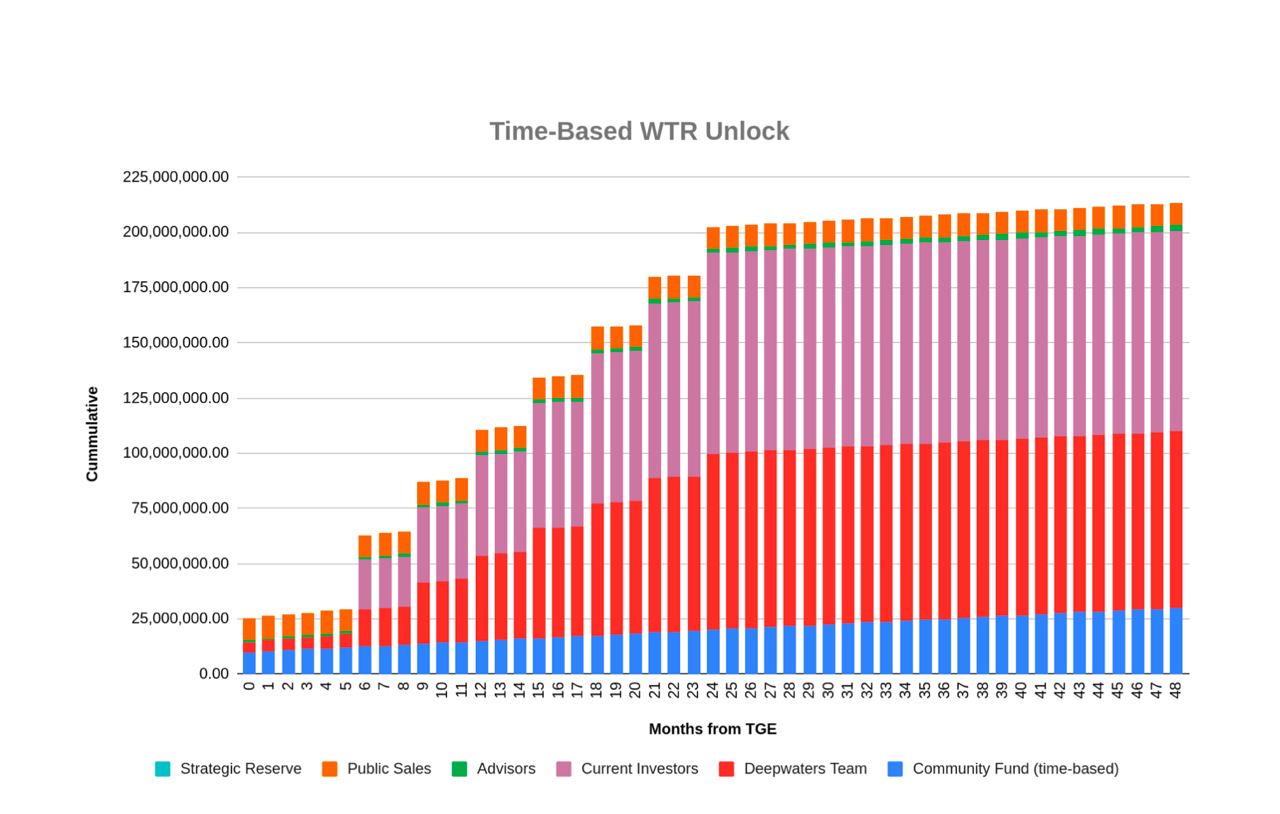
FUNDING NUMBERS
- Total Supply: 350M WTR
- Pre-Seed, tier 1 (4c): 16,866,250.00 WTR | 4.82%
- Pre-Seed, tier 2 (6c): 4,291,666.67 WTR / 1.23%
- Bridge (8c): 25,665,000 WTR | 7.33%
- Seed Round (12c): 25,000,000 WTR | 7.14%
- Avalaunch IDO (12c): 2,083,333.33 WTR | .59%
Total raise: $5.41M
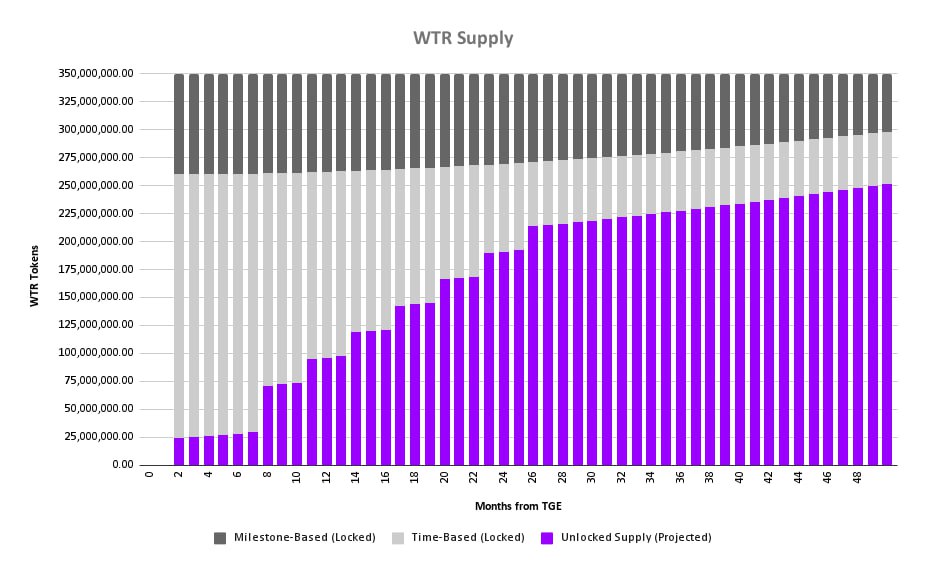
PROJECT TOKENOMICS & VESTING
Total Tokens (fully diluted): 350,000,000.00 WTR | 100.00%
Deepwaters Team: 80,000,000.00 WTR | 22.86%
Strategic Reserve: 63,192,083.34 WTR | 18.05%
Pre-Seed tier 1: 16,866,250.00 WTR | 4.82%
Pre-Seed tier 2: 4,291,666.67 WTR | 1.23%
Bridge: 25,650,000.00 WTR | 7.33%
Seed Round*: 25,000,000 WTR | 7.14%
Advisors: 5,000,000.00 WTR | 1.43%
Validator Rewards: 30,000,000.00 WTR | 8.57%
User Incentives: 30,000,000.00 WTR | 8.57%
Community Fund (milestone-based unlock): 30,000,000.00 WTR | 8.57%
Community Fund (time-based unlock): 30,000,000.00 WTR | 8.57%
Avalaunch IDO: 2,083,333.33 WTR | 0.59%
Marketing / Promotion: 7,916,666.67 WTR | 2.27%
Initial supply: 24,407,035.80 | 6.97%
*Seed round tokens may not be sold in their entirety. Remaining supply will be added to the future investors pool.
VESTING:
DEEPWATERS TEAM
88% of team allocation: 6-month cliff, quarterly distributions over a two-year period.
12% of team allocation: Set aside as ‘employee incentive pool;’ reserved for recruitment, retention, and bonuses—Discretionary unlock
STRATEGIC RESERVE
Held by Deepwaters for purposes of liquidity, partnerships, future investors, etc. Can be used at the discretion of the company with the following restrictions:
Cannot be reallocated to team or advisors
Cannot be sold on the open market by Deepwaters
Any sale or other disbursement of tokens must have at least a 6-month lockup / cliff (call options to market makers must be either 1) European or Bermudan style and have at least a 6-month period before they can be exercised, or 2) American style with the lowest strike price at least 100% above the then-current market price)
PRE-SEED, BRIDGE AND SEED
6-month cliff, quarterly distributions from mainnet launch over two years.
ADVISORS
Allocated for rewarding advisors to Deepwaters, but can remain unused or be allocated to further community programs.
Vesting varies across advisory and roles.
708,290 WTR unlocked at TGE
Projected 1,443,970 WTR unlocked at 1 year past TGE (unless new advisors are added and given token allocations)
Projected 1,958,210 WTR unlocked at 2 years past TGE (unless new advisors are added and given token allocations)
VALIDATOR REWARDS, USER INCENTIVES AND COMMUNITY FUNDS
These rewards are earmarked for Deepwaters users and validators.
Validator Rewards — Awarded to validators for ensuring security of Deepwaters. Milestone-based unlock.
User Incentives — Awarded to users to incentivize ecosystem growth and early adoption. Milestone-based unlock.
Community Fund (milestone)— Strategic reserve controlled by WTR governance: to be used for community incentive programs. Milestone-based unlock.
Community Fund (time) — These time-based rewards represent the strategic reserve controlled by WTR governance—to be used for community incentive programs.
Unlocked monthly over 4 years, starting at platform launch
AVALAUNCH SALE
50% at TGE, 50% in one month.
MARKETING / PROMOTION
Allocated for promotional purposes, including airdrops. No lockup.
OTHER:
Initial Circulating Supply: ~24.40M WTR (excluding liquidity tokens)
Initial Market Cap: ~2.929M USD (excluding liquidity tokens)
THE DEEPWATERS IDO ON AVALAUNCH:
Total Supply: 350M WTR
2083333.33 WTR at USD 0.12
Sale Size: 250,000 USD
REGISTRATION SCHEDULE:
Registration Opens: February 6th at 3:00 p.m. (UTC)
Registration Closes: February 13rd at 6:00 p.m. (UTC)
SALE SCHEDULE:
Validator Round Begins: February 15th at 6:00 a.m. (UTC)
Validator Round Closes: February 15th at 3:00 p.m. (UTC)
Staking Round Begins: February 15th at 3:30 p.m. (UTC)
Staking Round Closes: February 16th at 6:00 a.m. (UTC)
Booster Round Begins: February 16th at 6:00 a.m. (UTC)
Booster Round Closes: February 16th at 10:30 a.m. (UTC)





